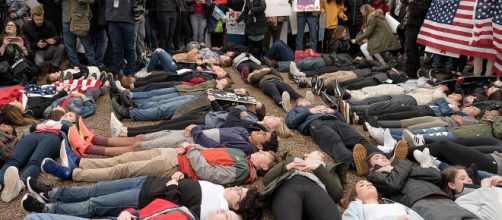Do something, kids cried after their friends were victims of an ambush in a south Florida high school last month. Maybe students should look in the mirror and claim responsibility for their role in the massacre.
One thing the grown-ups cannot do is confiscate licensed handguns and rifles owned by law-abiding Americans. The Constitution and later Supreme Court decisions affirm U.S. citizens' right to protect themselves. Unfortunately, many criminals have weapons. States are looking, and will continue to look at measures to prohibit the sale of guns to the mentally ill.
The federal government is expected to allow health agencies to study gun violence.
When concerned the government may act to “protect children”— like so many youth are expected to demand during the March for Our Lives on March 24 — business associations will self-regulate. The best thing adults can do is work together to create win/win strategies to solve problems. Rather than intervening in business affairs, the government asks professional associations to self-regulate. Much of the media industry has done this. Unlike the media associations, Everytown for Gun Safety plans to use children to deliver its message.
You do something
The first thing high school students should do is stop playing the victim.
Students at Marjory Stoneman Douglas High School bear some of the blame for the Nikolas Cruz shooting. Students mocked Cruz for being a loner.
By their accounts they “bullied Cruz a lot,” according to a story in the Miami Herald. A student said he remembers Cruz being teased in 10th grade. By then, Cruz was getting attention from students for his bizarre social media postings. In some of them, he posted pictures of himself with knives and guns.
“He would come over after school and was visibly upset about being teased, but he pretended that he really didn’t care,” a neighbor said. A younger Cruz attempted to join other kids riding their bicycles in the neighborhood, but the kids brushed him off and called him names.
Be responsible
A little kindness goes a long way. Instead of walking out of school in protest, walk up to the loner and try to start a conversation. If you see someone getting bullied, challenge the bullies. Report the bullies. Do not help them create another mass murderer.
Some of the more than 1,800 students at Marjory Stoneman Douglas High School failed miserably at this. As did students, staff and faculty at Columbine High School some 19 years earlier, and that played a part in the mass murder in Colorado.
Football players were allowed to terrorize just about any other student, reports in the New York Times and Washington Post later verified about Columbine. Weeks before that massacre, both Eric Harris and Dylan Klebold were confronted by a group of football players who sprayed them with ketchup and mustard and called them “f******” and “q*****." Neither school officials nor students did anything.
Two students, Harris and Klebold, went nuts one April 20, 1999. They murdered 12 students and a teacher, injured 22 others, and then turned their guns on themselves. This opened the door for researchers to investigate a link between bullying and school violence. A year after the massacre, an analysis by officials at the U.S. Secret Service found that of 37 premeditated School Shootings, bullying, which some of the shooters described "in terms that approached torment," played a major role in more than two-thirds of the attacks.
While neither the government nor industry will label video games, you can stop buying and playing the violent games. Video games don’t affect me, you think. Research shows that they do.
Violent video games desensitize players to violent imagery, according to a study in the Journal of Experimental Social Psychology.
More recent research on media violence and aggression agrees with the earlier findings. According to Psychology professor Douglas Gentile from Iowa State University: "What we’re coming down to is learning,” he said on NPR. “We can learn from all of these different ways. And it seems we don’t learn particularly differently from video games than from TV or movies."


